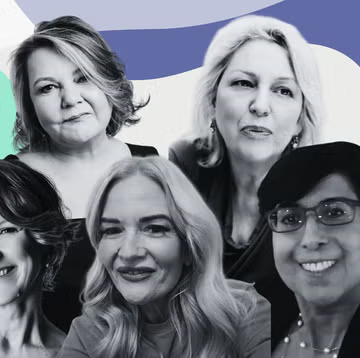
I knew from around the age of 8 that I was a ‘comfort eater’. I loved sweet, sugary foods, and my mum was a great cook, baking all sorts of delicious treats. After I started my period at 11, my body shape became very hourglass. I hated my new curves and wanted to be flat-chested like my friends at school.
I begged my mum to take me to a diet club and by the age of 14 I had been a member of Weight Watchers, and on a meal replacement diet plan, where I ate no solid food, just three shakes a day.
It marked the beginning of a very toxic restrict-and-binge eating cycle which developed into a full-blown food addiction.
Aged 25, my periods stopped completely, I went to see my GP, and when he asked me to weigh myself – the first time I had done so in years – I was horrified to see the scale registered almost 22 stone. I thought I was hovering around 15. The doctor bluntly told that I would not make 40 unless I made drastic lifestyle changes.
I cried all the way home, I could not believe how easily I had got to that weight, it really scared me. It spurred me on to make some huge lifestyle changes, but this time my motivation was my health, not to look a certain way, or to be a certain number on the scales, or dress size. I had one goal: to become healthier.
Food addiction isn’t taken as seriously as other addictions, but it is an addiction. I felt a huge sense of shame. It isolated me from everyone close to me as I was keeping a massive part of my life secret from them.
So, after losing 6 stone, I could not understand why my self-worth had not increased. In fact, the opposite happened. I was even more critical of my appearance, and I was still lacking confidence.
'Working together in a support group creates such a positive flow of energy 'Doing the ‘inner work’ is when the real healing began for me. I discovered a book by Louise Hay, titled How To Heal Your Life, and it gave me an understanding about how and why I used food to numb my emotions. It really was a light bulb moment.
I vowed at that point that no other woman should ever feel the same way I felt and have such a lonely, isolating, painful journey. I wanted to use my experiences to inspire others and break the taboo of food addiction. I hate thinking about people beating themselves up for being addicted to processed foods - that is what they are designed for!
I started Step by Step as a support group on Facebook during Lockdown after a friend told me how much my personal social media accounts had motivated her to exercise and eat healthily. I was surprised by this and did not believe that anyone would follow me, but three years later, I now have over 1,500 members in my group.
Starting Step by Step and sharing my story with others has been so healing, and it's exorcised a lot of my own demons. Working together in a support group creates such a positive flow of energy. I have met many wonderful people, and they tell me they really resonated with my story. I think this might be because so many weight loss ‘experts’ have never experienced food addiction; however, I can speak from experience, and I have genuine empathy for how people struggling with it feel.
Follow Link to read full story:
‘We set up support groups to help people like us navigate trauma and illness’